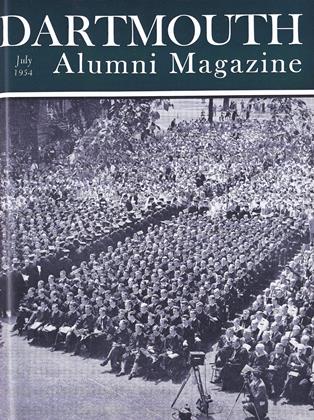"The Depression and the Class. of 1929" might well be the subtitle to the impressive class book published by 1929 to coincide with its 25th Reunion, with the hero being the average man of the group. A self-portrait in the form of a 385-page volume, Dartmouth Class of 1929, includes thumbnail autobiographical sketches with photographs of class members, and a survey compiled from unsigned questionnaires returned by 370 out of a possible 590 men.
Edited by Robert H. Ramage '29, the book which is dedicated to President Dickey '29 indicates that members of "illfated" 1929, while temporarily set back by the obstacle of the Depression looming in their paths shortly after graduation, have fared as well economically, have much the same interests, and enjoy the same degree of happiness as members of other classes taking stock in their 25th year out of college. In the majority of the biographical accounts, tribute was made to the training of a liberal arts education, which helped '29ers to deal with an unexpected economic emergency and a colder than usual "cold, cold world."
The portrait of the Dartmouth man of the Class of 1929 shows a composite individual who is married, has two or three children, is a business executive and lives in a large eastern city or its suburbs. He has an income of about $10,000 a year; votes Republican and reads from five to fifteen books a year. Although he owns a TV set he spends only six hours a week looking at it. This average man goes to the movies now and then, the theater two or three times a year, but practically never to a concert. He smokes and is a moderate drinker. He attends church occasionally rather than regularly and supports the United Nations. Although the late President Roosevelt was an honorary member of the Class of '29, 87 per cent of the members vote Republican. The average '29er has a hobby, probably gardening, wood-working or photography.
The outstanding record set by the class is in the field of matrimony. Although many members married rather late, only seven reported they have never married at all. Of the 363 who went to the altar, only fourteen have been divorced.
Incomes and happiness seem to be related, as the survey points out: "Of those indicating they are very happy, 42 per cent earned $20,000 and over, while only 29 per cent of the moderately happy group, and 7 per cent of those declaring themselves only 'slightly happy' fall into this income bracket."
But perhaps the clearest correlation relates happiness to the number of children. The survey reports: "Those having no children comprise a larger section of the 'slightly happy' group than of the 'moderately happy' and 'very happy' groups. Similarly, no one with four or more children is only slightly happy." Nine out of ten men answering the questionnaire say they are very happy or moderately happy, with only the ministers, the accountants and one man who does nothing at all saying they are completely happy.
Dartmouth still would rate first as choice of college with 85 per cent, who say they would do it over again. Looking over their careers to date, 51 per cent feel they have made adequate progress since graduation; 30 per cent believe they have not; and 19 per cent are still thinking it over.
Prof. Hadley Cantril '28 of the Office of Public Opinion Research at Princeton University evaluated the survey. President Emeritus Ernest M. Hopkins '01 wrote the "Letter to the Class." G. E. Wiedenmayer '29, for the Book Committee, arranged the summary based on the questionnaires, giving credit to Dartmouth's Psychology Department and to Professors Albert Hastorf and Henry Odbert '30 for their tabulation of replies. F. William Andres, Secretary-Chairman of the Class of 1929, wrote the foreword to the volume.
 View Full Issue
View Full Issue
More From This Issue
-
 Feature
FeaturePresident Emeritus Hopkins Is Honored With Dartmouth's First Alumni Award
July 1954 -
 Feature
FeatureRobert S. Oelman '31 Heads Alumni Council for 1954-55
July 1954 -
 Feature
FeatureE. S. French Retires as Life Trustee; Ruml Succeeds Him
July 1954 -
 Feature
FeatureAnother Record for the Fund
July 1954 -
 Class Notes
Class Notes1929's Record-Breaking 25th
July 1954 By CHRISTIAN E. BORN '29, BILL ANDRES, SQUEEK. -
 Article
ArticleThe 1954 Commencement
July 1954 By FRANK PEMBERTON
Article
-
 Article
ArticleCHICAGO PLANS NATIONAL DARTMOUTH POW-WOW
November 1923 -
 Article
ArticleMasthead
November 1956 -
 Article
ArticleGIFTS, GRANTS & BEQUESTS
DECEMBER 1972 -
 Article
ArticleThe Dartmouth Trustee Election
Sept/Oct 2007 -
 Article
ArticleDartmouth Chapter of Phi Beta Kappa
October 1937 By LEON B. RICHARDSON '00 -
 Article
ArticlePIKE'S ARITHMETIC
April 1926 By Professor Bancroft H. Brown

